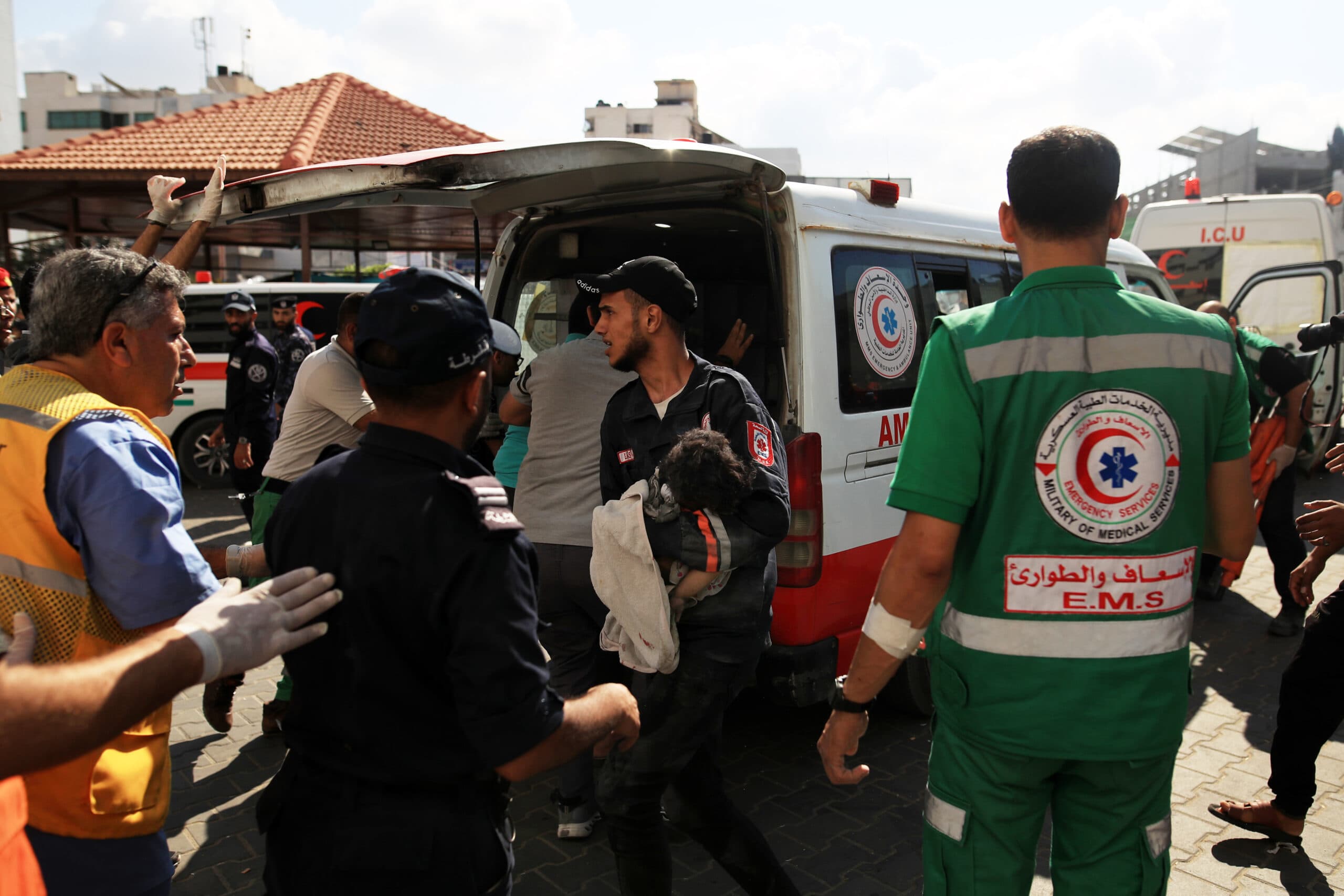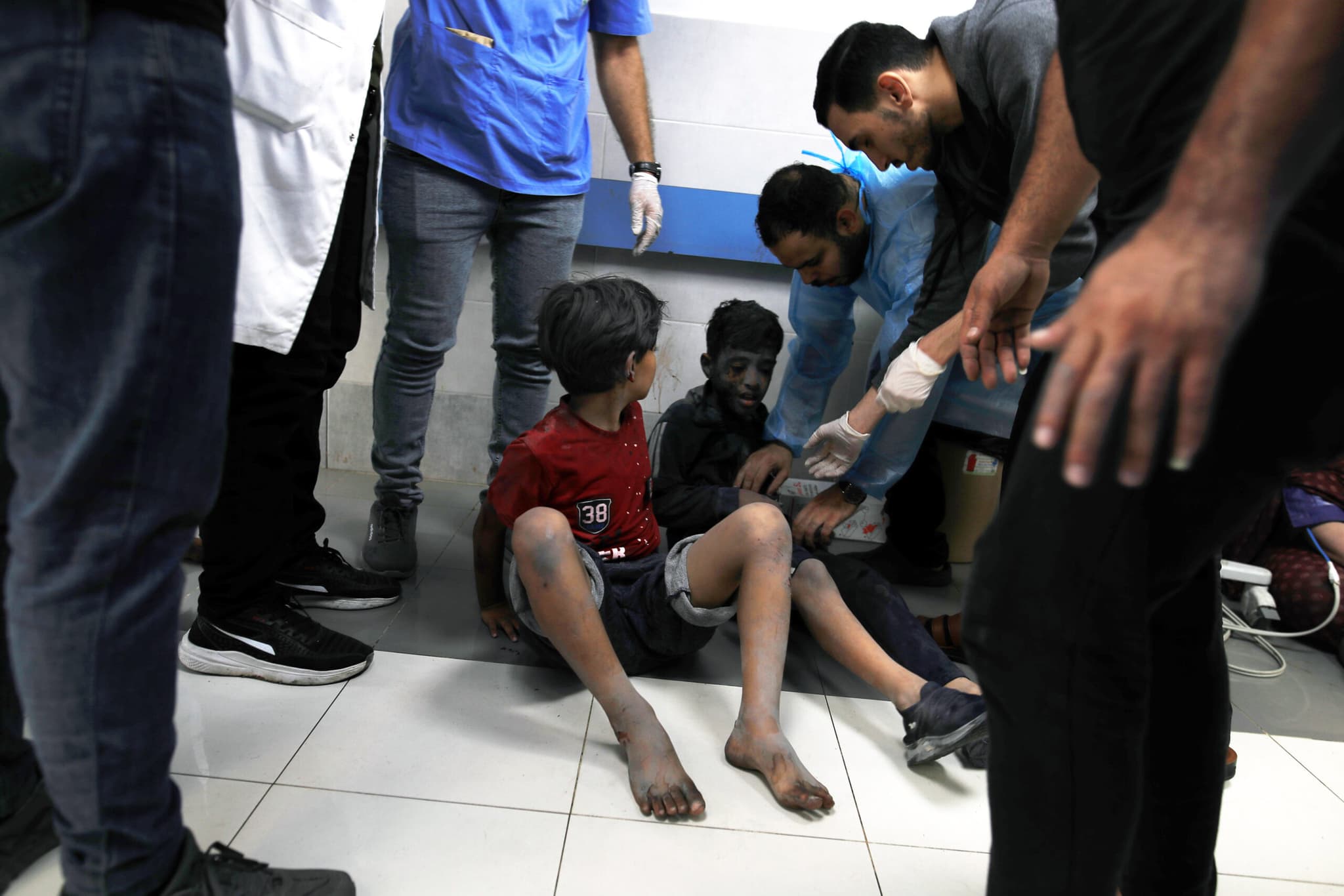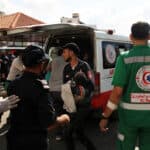
Violations of the IHL Rules on the Protection of Healthcare Applicable in Gaza
21 March 2024As the hostilities between Israel and armed groups in Gaza persist and the levels of violence in the West Bank, including East Jerusalem, remain high, the Diakonia IHL Centre provides regular updates regarding legal aspects of the evolving situation. This update covers violations of the rules on the protection of healthcare applicable in Gaza.
A full list of legal updates is available here.
The number of people in need of medical care in Gaza is rapidly increasing with every passing day, but access to healthcare is becoming more and more difficult, if not impossible. At the time of writing, more than 31,000 Palestinians have been killed and over 74,000 have been injured. In addition to injuries caused by the ongoing hostilities, fast-spreading diseases and catastrophic levels of food insecurity resulting in starvation add to the numbers of people in need of medical treatment. At the same time, the health system in Gaza has all but collapsed: only a third of hospitals are functioning, and then only partially. For the most part, medical services, including surgical operations, are provided without any basic resources such as clean water, electricity, or essential medical supplies such as anaesthetics. This has had catastrophic repercussions for prenatal care and infant and maternal health, with just two hospitals in the whole of Gaza still providing maternity services; an average of 180 women give birth every day amidst a sharp increase in obstetric complications, infections, and malnutrition.
Hostilities occurring during an armed conflict inevitably have an adverse impact on access to healthcare. However, the alarming state of healthcare in Gaza is not only the result of the ongoing hostilities. The health system in the Strip was already in dire straits prior to 7 October 2023 due to previous rounds of hostilities and the closure that Israel has imposed since 2007, complicating the entry of medical supplies and equipment as well as patients’ access to specialised care both inside Gaza and abroad. Additionally, since 7 October, the situation has been exacerbated by Israeli policies and practices specifically directed at medical services. A forensic analysis of documented attacks against hospitals on the basis of media reports and imagery concluded that there is ‘a repeated and consistent pattern of attacks on hospitals across the [Gaza Strip], defined by intimidation, attacks on surrounding areas, direct targeting, siege, and occupation’.
The remainder of this legal update assesses Israel’s documented patterns of behaviour with regards to healthcare in Gaza against relevant provisions of international humanitarian law (IHL). It first outlines the IHL rules that establish a general protection of healthcare in situations of armed conflict. Next, it examines the specific protections that IHL affords to healthcare, respectively, in the conduct of hostilities, and in situations of occupation. Finally, it addresses obligations arising from the order on provisional measures rendered by the International Court of Justice (ICJ).
General protection of healthcare under IHL
Under IHL, wounded and sick persons must be respected and protected both in international and non-international armed conflicts. To ensure their care, medical units (such as hospitals), medical transports, and medical personnel are also conferred special protection regimes which are applicable at all times throughout armed conflicts. These objects and persons must be respected and protected in all circumstances. Broadly speaking, the obligation to respect entails that, first and foremost, they may not be attacked, and that their work may not be interfered with in any way. The obligation to protect, on the other hand, may require parties to the conflict to take positive action to ensure that the medical services are properly functioning, for example by providing transports for the delivery of medical supplies if needed, or by securing hospital roads for safe access.
Medical units and transports lose their special protection if they are used to commit, outside of their humanitarian function, acts harmful to the enemy. Likewise, medical personnel lose their special protection if they commit, outside their humanitarian function, acts harmful to the enemy. The loss of protection thus requires the acts to meet two cumulative criteria: being ‘outside of their humanitarian function’ and ‘harmful to the enemy’. Therefore, the use of hospitals for non-medical purposes solely outside their humanitarian function, but not in a manner that is harmful to the enemy, such as sheltering persons displaced due to the ongoing hostilities, does not result in loss of protection. Even when a hospital is used to commit, outside of its humanitarian function, acts harmful to the enemy (for example, sheltering able-bodied combatants or storing weapons and munition), its protection ceases only after a warning has been given and, whenever appropriate, accompanied by a reasonable time limit, and this warning remains unheeded. Only then may the services be interfered with, and during hostilities, the objects and persons may be engaged, provided that the attacks comply with the principles on conduct of hostilities (see below).
Applying these general rules to publicly available information concerning the events currently unfolding in Gaza, including information provided by the Israeli army itself, points to the conclusion that Israel is violating its obligations under IHL. For instance, the Israeli Coordinator of Government Activities in the Territories (COGAT), which is in control of the entry of aid into the Strip, has reportedly rejected the entry of a wide range of medical supplies and medicines based on ‘arbitrary and contradictory criteria’, or delayed the entry of such supplies via ‘[p]rolonged and unpredictable administrative procedures’. Hospitals have been damaged and rendered inoperative due to the aerial campaign and ground operations. Ambulances and other medical transports have been subjected to attacks and severe restrictions in carrying out their work. Medical personnel have been killed in attacks, detained, subjected to inhumane treatment, and prevented from performing their duties. Meanwhile, claims made by the Israeli military as to the loss of protection of medical units and transports – for example, most recently, the allegation of Hamas fighters being present at Al-Shifa Hospital in Gaza City, the largest in the Strip – cannot be independently verified and should be treated with extreme caution.
Protection of healthcare in the conduct of hostilities
In the conduct of hostilities, medical units and transports can be attacked only if they lose their special protection and fall within the definition of a military objective. Medical personnel likewise can only be attacked if they lose their special protection and are targetable under the rules on conduct of hostilities. Any claims as to such a loss of protection – for example, that ambulances are being used to transport (non-injured) Hamas fighters and weapons – must be subjected to close scrutiny – because they cannot, for the time being, be independently verified and, if they turn out to be inaccurate, carry potentially grave humanitarian consequences. When in doubt, the presumption must be that medical units, transports, and personnel have not lost their special protection. Furthermore, all attacks must be carried out in compliance with the principles of distinction, proportionality, and precautions. Importantly, it is increasingly accepted that reverberating effects of attacks – those effects which may not be direct or immediate, but are nevertheless caused by the attacks and are foreseeable by the attacker – must be taken into account in the assessment of proportionality. For example, the destruction or damaging of hospitals or certain specialised wards can reasonably be expected to result in injury or loss of life due to lack of medical services, in addition to those caused by, e.g., the bombardment of the hospital itself. The consideration of reverberating effects is particularly important in urban environments, where infrastructure is interconnected. For example, even where medical services are not directly targeted, their operation can be severely affected by the destruction or damaging of the electricity network or water infrastructure. Lastly, the principle of precautions requires that parties to the conflict take all feasible precautions to avoid, or at least to minimise incidental loss of civilian life, injury, and damage to civilian objects, including hospitals. When it comes to attacks against hospitals and medical transports specifically, it has been suggested that precautionary measures should include plans for the evacuation of patients and staff as well as for the delivery of medical services during and restoration after the attack. More generally, parties must take all feasible measures to avoid or minimise damage to medical services. They also have a general obligation to spare the wounded and sick and to adopt, ‘as far as possible, active measures for their safety’.
It remains highly doubtful that Israeli forces have consistently complied with these obligations. Under the conduct of hostilities rules, the lawfulness of a specific attack must be analysed on an individual basis (rather than from the perspective of the military operation as a whole), and ex ante (i.e., based on considerations by the attacker prior to the attack, not ex post facto according to what actually transpired). Such an assessment is further complicated by the fact that parties to hostilities generally do not make the full information that formed the basis of their targeting decisions and related proportionality calculi publicly available. Certain patterns of conduct nonetheless emanate from public reports about Israeli attacks that give rise to grave concerns as to their lawfulness:
- For one, there have been reports about attacks on hospitals and ambulances being carried out without warning.
- Furthermore, hospitals in Gaza generally provide care to hundreds of patients, if not more, many of them critically injured, often in unimaginably dire conditions, with thousands of internally displaced persons sheltering on hospital premises. Given the catastrophic state of healthcare and overall calamitous humanitarian situation in Gaza, it is also foreseeable that any additional damage to or destruction of healthcare facilities would lead to further significant loss of life. It is submitted that all these factors would have to be considered on the ‘civilian harm’ side of the proportionality calculus for each individual attack – and this would arguably require a very weighty military advantage in each particular instance so as not to be considered excessive. Reported attacks on and around hospital premises that have each killed dozens, left many more injured, and further decimated the healthcare system as well as indications that 2,000-pound munitions may have been used in proximity to 11 hospitals (placing them within the bombs’ ‘lethal fragmentation radius’) thus prompt concerns about Israel’s respect for the principle of proportionality.
- In addition, sick and displaced persons have reportedly been unable to leave hospitals under attack, there not being a ‘routine medical evacuation process’, and medical services have been interrupted; at Nasser Hospital in Khan Younis, displaced persons were reportedly left with the ‘impossible’ choice to stay on the hospital premises during fighting or to leave – as they had been instructed to do by the Israeli military – even though potential escape routes are likely not safe and might even expose them to additional harm. Such reports cast serious doubt upon Israel’s attitude towards the duty to take precautions and its general obligation to spare the wounded and sick.
- Israel may also have carried out attacks on healthcare facilities even when they were no longer used to commit acts harmful to it (Israel raided Al-Shifa Hospital in November 2023, for example, but US intelligence sources later suggested that while the complex was likely used by Hamas and Palestinian Islamic Jihad, their fighters had ‘largely’ left the premises prior to the entry of Israeli forces).
Taken together, there are strong grounds for concern that Israel’s conduct has failed to respect the rules on the protection of healthcare during the conduct of hostilities.

Protection of healthcare during occupation
In occupied territories, the occupying power has an obligation to ensure medical supplies to the fullest extent of its means, in particular if the resources of the occupied territory are inadequate. If the occupying power itself is unable to provide medical supplies for the population, it must allow for and facilitate with all means at its disposal the passage of humanitarian relief. The occupying power also has an obligation to ensure and maintain medical establishments and services, including by implementing measures against infectious diseases and epidemics, and to allow medical personnel to carry out their duties. This obligation entails that, at the very least, the occupying power refrain from interfering with the functioning of hospitals. If the medical services are inadequate, the occupying power must, in cooperation with the local authorities, take all measures in its power to ensure their proper functioning to meet the needs of the local population. As explained in a previous legal update, Israel is bound by the law of occupation in Gaza, and the scope of its obligations under this body of law has expanded as it has gained firmer control over the Strip with a significant ground presence.
Even acknowledging that the aforementioned protections impose obligations of means, not of result (requiring an occupying power to make best efforts, not to produce a certain outcome), and that the existence of hostilities may hinder or preclude some courses of action on its part, several of Israel’s documented practices seem to again run counter to what the law mandates:
- Rather than refrain from interfering with the work of healthcare facilities, let alone cooperate with national authorities to ensure their proper functioning, Israel has reportedly laid ‘siege’ to hospitals as their resources dwindled, often leaving patients without a ‘routine medical evacuation process’ or access to proper care and food; as noted, only 12 hospitals in the Gaza Strip remain partially functional, despite a sharp uptick in medical needs amongst a population of more than 2 million. Israel’s approach seems to have been that public authorities in Gaza, including the Ministry of Health and its officials, are affiliated with Hamas and thus not fully trustworthy, or may even be military targets.
- Far from allowing medical personnel to continue their work – which requires exempting them from (comparatively benign) measures such as ‘restrictions on movement, [and] requisitioning of vehicles, supplies or equipment’ – staff at several hospitals reported being detained by Israeli forces and subjected to ill-treatment. (Torture and ill-treatment are always unlawful, and the veracity of the alleged grounds for detention proffered by the authorities should be subjected to very close scrutiny – regarding Nasser Hospital in Khan Younis, for example, the Israeli military made the – unverified – claim to have arrested ‘about 200 terrorists and suspects of terrorist activity … including some who posed as medical teams’).
- Far from taking steps to combat the spread of infectious diseases – which may require, for example, ‘the isolation and accommodation in hospital of people suffering from communicable diseases, and the opening of new hospitals and medical centres’ – 1.7 million Gazans are internally displaced amidst a catastrophic humanitarian situation, including a breakdown of water and sanitation facilities, with around 1.5 million reportedly crowded into the small area around Rafah after being repeatedly told by the Israeli military to move south; hundreds of thousands of infections with acute respiratory diseases, diarrhoea, scabies, chickenpox, and jaundice have been reported. (The three field hospitals that have recently been set up by the UAE, the International Medical Corps (IMC), and Jordan, out of which only the former two are fully functional, are woefully inadequate to meet the enormous needs.)
- Far from ensuring that the people of Gaza are adequately supplied, doctors have been facing an extreme shortage of medical supplies and equipment, forcing them to perform surgeries without anaesthetics, while treatment for complex injuries is often unavailable altogether. Efforts by humanitarian actors (third parties) to alleviate the dire situation are hampered due to denials or delays in the entry of humanitarian relief as well as ‘[a]id convoys [coming] under fire and [being] systematically denied access to people in need’.
In all these regards, even accounting for the challenging and at times chaotic conditions that reign during hostilities, given the resources at its disposal and promises of international assistance, one can hardly conclude that Israel has been making best efforts to discharge its obligations regarding healthcare under the law of occupation.
Obligations stemming from the ICJ order on provisional measures
In addition to its obligations under IHL, Israel is also bound by the provisional measures order issued by the ICJ on 26 January 2024 in the South Africa v. Israel case, where the Court ordered that Israel ‘take immediate and effective measures to enable the provision of urgently needed basic services and humanitarian assistance to address the adverse conditions of life faced by Palestinians in the Gaza Strip’. Israel’s failure to maintain and restore access to healthcare, including by providing or allowing the entry of medical supplies and equipment, also constitutes a failure to comply with the Court’s order.
Cover photo: Gaza under attack, al-Shifa hospital, Gaza city, 18 October 2023. Photographer: Mohammed Zaanoun/ActiveStills photo collective. All rights reserved.
